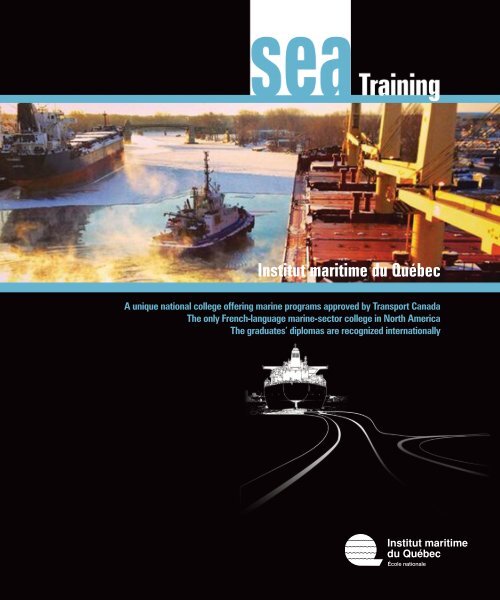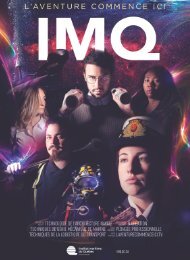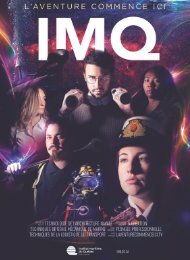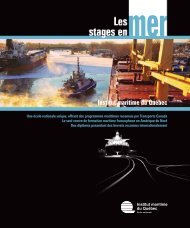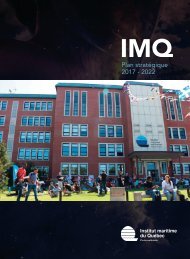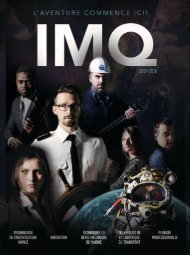Sea training
A unique national college offering marine programs approved by Transport Canada The only French-language marine-sector college in North America The graduates’ diplomas are recognized internationally
A unique national college offering marine programs approved by Transport Canada
The only French-language marine-sector college in North America
The graduates’ diplomas are recognized internationally
You also want an ePaper? Increase the reach of your titles
YUMPU automatically turns print PDFs into web optimized ePapers that Google loves.
Institut maritime du Québec<br />
A unique national college offering marine programs approved by Transport Canada<br />
The only French-language marine-sector college in North America<br />
The graduates’ diplomas are recognized internationally
INSTITUT MARITIME DU QUÉBEC (IMQ)<br />
A Unique,<br />
Marine-sector College<br />
in<br />
Québec<br />
Founded in Rimouski in 1944, the Institut maritime du Québec (IMQ) is Canada’s only French-language marine-sector<br />
educational establishment. As one of Québec’s five Écoles Nationales 1 , it offers top-calibre, college-level technical programs<br />
in Naval Architecture, Navigation, Marine Engineering and Transport Logistics as well as an Attestation of College Studies in<br />
Professional Diving.<br />
Internationally Renowned<br />
IMQ has a reputation for excellence the world over for the quality of the education it offers, its far-reaching marine-sector<br />
expertise, and the recognized skills of its graduates, many of whom currently hold key positions in the North American and<br />
European marine industries.<br />
We would like to thank our actual and graduated students, as well as our partners from the industry for allowing us to use<br />
their photos.<br />
1<br />
Québec has a group of five schools whose special statuses are recognized by the Québec Department of Education (Ministère de l'Éducation). Originally, these school<br />
were independent specialized educational establishments that were integrated into various CEGEPs (colleges of general and vocational education) in the 1970s and<br />
then formed a group in 1988. These Écoles Nationales are schools that offer programs which are unique in the Québec school system.<br />
Contact information<br />
<strong>Sea</strong> Training Coordinator<br />
» 2<br />
Mélanie Leblanc<br />
Assistant Director, Student Services<br />
418 724-2822, ext. 4401<br />
418 750-7026<br />
melanie.leblanc@imq.qc.ca<br />
Assistant <strong>Sea</strong> Training Coordinator<br />
Marie-Hélène Simoneau<br />
418 724-2822, ext. 4403<br />
418 318-5974<br />
msimoneau@imq.qc.ca<br />
Student Services<br />
418 724-2822, ext. 4400<br />
serviceauxeleves@imq.qc.ca<br />
53, rue Saint-Germain Ouest<br />
Rimouski (Québec) CANADA G5L 4B4<br />
www.imq.qc.ca<br />
laventurecommenceici.tv
Introduction<br />
To meet labour market requirements, the IMQ offers two marine-sector programs that meet international<br />
STCW standards and are Transport Canada-approved:<br />
Navigation<br />
Marine Engineering<br />
Apprentice officers receive top-quality <strong>training</strong> on state-of-the-art equipment. Study programs run four years<br />
and include 12 months at sea in Navigation and 10 months in Marine Engineering, divided into three <strong>training</strong><br />
sessions. <strong>Sea</strong> time is compulsory to enable students to take Transport Canada exams and obtain their First<br />
Officer’s certificate:<br />
Watchkeeping Mate<br />
Officer in Charge of an Engineering Watch<br />
This information document provides further details on our marine-sector programs and on the possibility of<br />
<strong>training</strong> our apprentice officers on board your ships.<br />
Mélanie Leblanc<br />
<strong>Sea</strong> Training Coordinator<br />
» 3
» Hands-On <strong>training</strong><br />
The apprentice officers’ first sea <strong>training</strong> gives them an opportunity to be full-fledged crew members and to validate their<br />
career choice. Without our industry partners, our students would not be able to acquire the experience at sea required by the<br />
Regulations.<br />
Partners in Success<br />
IMQ counts on the collaboration of many Canadian and international shipping companies for its students’ sea <strong>training</strong>.<br />
By taking apprentice officers on board their ships, these companies:<br />
help offer specific <strong>training</strong> to the new generation of mariners within their company;<br />
begin a staffing process by <strong>training</strong> new candidates in their company’s procedures and policies;<br />
maintain a long tradition of passing on marine-related knowledge;<br />
enable students to apply the knowledge and skills they have acquired in the classroom.<br />
» 4
Affiliation Agreement (contract)<br />
When a company agrees to take IMQ apprentice officers on board, it becomes a <strong>training</strong> partner and an affiliation agreement,<br />
stipulating the conditions agreed to, is signed by both parties.<br />
This agreement contains the roles and responsibilities of the company, the officers on board its ships and IMQ. The contract<br />
is valid until one of the parties decides to terminate it.<br />
IMQ’s Obligations to the Partner Company<br />
Plan sea <strong>training</strong> in conjunction with the company, specifically: number of berths on board available, signing on/<br />
signing off terms and conditions, and apprentice officer replacement;<br />
Before boarding, send an e-copy of documents required for the apprentice officer under the Regulations and company<br />
policy;<br />
Give participating marine-sector companies a description of the learning activities’ specific goals and the sea <strong>training</strong><br />
evaluation procedure;<br />
Provide any technical assistance required by company staff responsible for supervising apprentice officers’ sea <strong>training</strong>;<br />
Pay the company $20 CAN/day per apprentice officer to cover administrative costs, expenses related to supervision,<br />
practical activities, use of equipment for <strong>training</strong> purposes, services to apprentice officers and signing on costs;<br />
If necessary, help pay for airfare.<br />
»<br />
If you would like to welcome apprentice officers on<br />
board, please contact us!<br />
» 5
Obligations<br />
Partner Company’s Obligations to IMQ and its Apprentice Officers<br />
As soon as possible, ideally 6 to 8 weeks before the planned sea <strong>training</strong>, confirm the approximate signing on dates and<br />
number of berths on board available to IMQ:<br />
Number of berths on board for Marine Engineering students;<br />
Number of berths on board for Navigation students.<br />
Supervise apprentice officers’ learning in keeping with contract provisions;<br />
Follow the <strong>training</strong> record book’s instructions concerning apprentice officers’ work as well as those of any other special<br />
agreement, if applicable;<br />
When apprentice officers sign on, inform them of the ship’s rules (basic and operating);<br />
Allow apprentice officers to use available equipment on board and to participate in different ship maintenance and<br />
operations-related tasks;<br />
Contact the IMQ <strong>Sea</strong> Training Coordinator to prevent problems during sea <strong>training</strong> and before suspending an apprentice<br />
officer;<br />
Provide apprentice officers at sea with food and board during sea <strong>training</strong>.<br />
»<br />
Should there be a problem with the apprentice<br />
officer, it is important that the sea <strong>training</strong><br />
coordinator be advised as soon as possible. Contact<br />
the sea <strong>training</strong> coordinator here!<br />
Mathieu Tremblay-Ouellet<br />
» 6
» Insurance coverage<br />
Simon Lebrun<br />
Work-related Accidents - CNESST<br />
Students in the IMQ Navigation and Marine Engineering programs who have qualified for sea <strong>training</strong> are covered by the<br />
Québec government’s industrial health and safety board (Commission des normes, de l’équité, de la santé et de la sécurité au<br />
travail – CNESST).<br />
This coverage applies under the following conditions:<br />
the student has a permanent residence in Québec;<br />
the student was placed in the company by the IMQ <strong>Sea</strong> Training Coordinator, who approved the sea <strong>training</strong>;<br />
the student’s signing on has been confirmed and entered in the College’s information system;<br />
the student is on board as an apprentice officer and does not receive wages for the duties performed (monthly allowances<br />
and scholarships are not considered wages).<br />
» 7
Among other things, this coverage includes:<br />
repatriation, even if the ship is abroad. The company must pay for transportation from the ship to the nearest hospital.<br />
The CNESST pays the remaining travel costs;<br />
any costs related to an accident that occurs during travel related to signing on;<br />
any costs related to an accident that occurs on board during normal sea <strong>training</strong>/shipboard activities.<br />
IMPORTANT<br />
Please note that when the apprentice officer is paid at an hourly rate by the company (for example, when he does overtime),<br />
he is no longer covered by the CNESST with the Collège de Rimouski, but rather by the company.<br />
Any accident that occurs on board and results in physical injury to an IMQ apprentice officer must be reported to the <strong>Sea</strong><br />
Training Coordinator at 418-750 7026. The apprentice officer must draft an accident report for the compensation procedure to<br />
begin.<br />
College’s Liability Insurance<br />
The general liability insurance set up for CÉGEP programs covers insured students for all activities organized by the CÉGEP<br />
on-site or off-site (in Québec and all over the world), including sea <strong>training</strong>.<br />
This insurance applies in cases of negligence or fault on the part of the insured–in this case, the apprentice officer–and<br />
coverage is limited to compensatory damages. Compensation is paid according to the percentage of liability.<br />
General liability insurance is not accident insurance and does not apply if apprentice officers are injured during an activity<br />
through no proven fault or negligence of their own.<br />
Personal Insurance - Health/Accident<br />
On company’s request, apprentice officers on sea <strong>training</strong> must have personal health/accident insurance in case an accident<br />
occurs on land while the ship is docked, and to cover any expenses related to hospitalization in case of illness. They must<br />
provide proof of this insurance for their sea <strong>training</strong> file.<br />
While in Canadian waters, apprentice officers are protected by Québec’s health insurance program - provincial insurance that<br />
covers all Québec residents. However, they are encouraged to have personal health insurance because not all costs are covered<br />
in full if the health care is provided in another province.<br />
Reference: Services covered during a temporary stay outside Québec,<br />
http://www.ramq.gouv.qc.ca/en/citizens/temporary-stays-outside-quebec/health-insurance/Pages/services-covered.aspx<br />
(consulted in March 2017)<br />
» 8
» Preparing to go to sea<br />
Simon Charest<br />
Before leaving for sea <strong>training</strong>, in addition to their coursework, apprentice officers’ personal preparation is supervised. Several<br />
meetings are held to prepare the students for this unique experience and to discuss subjects such as life at sea, isolation, hierarchy<br />
and the apprentice officers’ roles on board ship.<br />
Throughout the session preceding sea <strong>training</strong>, apprentice officers are responsible for preparing their sea <strong>training</strong> file. This file<br />
contains a personal information sheet and a copy of all documents and valid certificates required to go to sea.<br />
Confirmation of Berths on Board by Partner Companies<br />
A few weeks before the scheduled departure, a sea <strong>training</strong> eligibility list is produced to determine which students will go to<br />
sea. To be on the list, students must have completed their sea <strong>training</strong> file and passed the courses required under an in-house<br />
regulation governing sea <strong>training</strong> (Politique régissant l’organisation et l’admissibilité aux stages en mer).<br />
» 9
<strong>Sea</strong> Training Assignment Meeting<br />
Once the students have submitted the required documents and the sea <strong>training</strong> list has been confirmed, the Assistant<br />
<strong>Sea</strong> Training Coordinator meets each apprentice officer individually.<br />
At this meeting, the students are guided in their sea <strong>training</strong> choices based on the berths available on board confirmed by the<br />
different companies, their interest with regard to voyage and cargo types, company-specific requests and student-specific<br />
constraints (allergies, limitations under the Transport Canada medical certificate).<br />
The sea <strong>training</strong> confirmation documents and individual company’s hiring contracts are completed in these meetings. If need<br />
be, meetings are scheduled for screening D&A tests or medical examinations required by certain companies.<br />
The Assistant <strong>Sea</strong> Training Coordinator also gives the students the documents to be brought on board:<br />
The Supervising on Board letter, specifying the objectives of the sea <strong>training</strong>, the required supervision on board as well as<br />
the company’s obligations towards IMQ and its apprentice officers ;<br />
The Apprentice officer’s mid-term and end of sea <strong>training</strong> evaluation forms.<br />
Once the sea <strong>training</strong> has been confirmed, the Assistant <strong>Sea</strong> Training Coordinator sends an e-version of the sea <strong>training</strong> file<br />
to the person in charge of boarding with the company which contains the following:<br />
Sheet containing apprentice officer’s general information;<br />
<strong>Sea</strong>man’s book;<br />
Passport that is valid for the duration of the sea <strong>training</strong> (+ 6 months);<br />
Valid medical certificate issued by a Transport Canada-certified physician;<br />
Up-to-date vaccination record and proof of vaccination, in keeping with marine-sector requirements;<br />
Proof of yellow fever vaccination;<br />
Certificate of Proficiency for Basic First Aid or Marine Advanced First Aid;<br />
Certificate of Proficiency for STCW Basic Safety;<br />
Certificate of Proficiency for Ship Personnel with Designated Security Duties;<br />
Criminal record.<br />
If required by the company’s in-house procedure, the file will also contain:<br />
Specific medical examinations required by the company;<br />
Screening test.<br />
» 10
Supervision on Board Ship<br />
As soon as the apprentice officers have boarded ship, a crew member must take charge of them and assign them to a<br />
supervising officer. Apprentice officers must be informed of their supervisor’s expectations regarding their tasks, responsibilities<br />
and attitude.<br />
Throughout their sea <strong>training</strong>, apprentice officers must be supervised by an officer. They should be assigned to the supervising<br />
officer’s watch, but this must not prevent them from participating in other tasks as well.<br />
In addition to taking part in different daily duties on board ship, apprentice officers must complete a <strong>training</strong> record book to<br />
be submitted for correction when they return to class. This <strong>training</strong> record book should be verified frequently by the supervising<br />
officer who is also responsible for validating and signing the practical tasks to be performed by the apprentice officer.<br />
Apprentice Officer’s Evaluation<br />
Halfway through the sea <strong>training</strong>, the apprentice officer and his supervising officer must complete the mid-term evaluation.<br />
The goal of this meeting is to discuss the performance of the apprentice on board and identify the aspects of his job that he<br />
must improve for the rest of his <strong>training</strong>.<br />
Before the apprentice officer signs off, he must meet with his supervising officer in order to complete and sign the final evaluation<br />
of the apprentice officer.<br />
The original documents remain with the student and copies are mailed to msimoneau@imq.qc.ca.<br />
»<br />
Should there be a problem with the apprentice officer,<br />
it is important that the sea <strong>training</strong> coordinator<br />
be advised as soon as possible. Contact the sea <strong>training</strong><br />
coordinator here!<br />
Philippe Émond<br />
» 11
»<br />
NAVIGATION PROGRAM<br />
3-year Program + 12 months at sea<br />
SESSION/YEAR<br />
FALL<br />
(mid-August to<br />
late December)<br />
WINTER<br />
(January to end of May)<br />
SUMMER<br />
DURING<br />
THE SCHOOL YEAR<br />
1 Courses Courses <strong>Sea</strong> <strong>training</strong> 1 Marine Emergency<br />
Duties <strong>training</strong><br />
2 Courses <strong>Sea</strong> <strong>training</strong> 2 Marine Emergency<br />
Duties <strong>training</strong><br />
3 Courses Courses Marine Emergency<br />
Duties <strong>training</strong><br />
4 <strong>Sea</strong> <strong>training</strong> 3 Courses<br />
<strong>Sea</strong> <strong>training</strong> dates are as follows:<br />
<strong>Sea</strong> <strong>training</strong> 1 (Summer): late May to mid-August;<br />
<strong>Sea</strong> <strong>training</strong> 2 (Winter): late December to late May;<br />
<strong>Sea</strong> <strong>training</strong> 3 (Fall): mid-August to late December.<br />
» 12
SEA TRAINING OBJECTIVES<br />
NAVIGATION SEA TRAINING 1<br />
Navigation students complete their first sea <strong>training</strong> after two sessions of theoretical studies. The first sea <strong>training</strong> lasts<br />
approximately two months and takes place from late May to mid-August.<br />
In the first school year, students acquire knowledge related to the following subjects:<br />
<strong>Sea</strong>manship;<br />
Deck apparatus;<br />
Basic knowledge of marine-sector regulations and conventions;<br />
Basic knowledge of various publications and chartwork;<br />
Operation and use of radar, echosounder and loch;<br />
Marine safety;<br />
Basic knowledge of the various types of vessels and their cargo;<br />
Nautical rules and plotting techniques;<br />
Basic electricity;<br />
Shipbuilding (terminology and construction elements).<br />
Overall Objective:<br />
The first sea <strong>training</strong>’s main objective is to enable apprentice officers to confirm their career choice. It is important that they<br />
have a chance to understand and participate in the different aspects of work at sea.<br />
Specific Objectives:<br />
Familiarize oneself with the occupation of deck officer and life on board;<br />
Familiarize oneself with ships;<br />
Put seamanship tasks into practice;<br />
Familiarize oneself with the Third Officer’s safety-related tasks;<br />
Familiarize oneself with the wheelhouse, the different instruments, the different publications;<br />
Log steering time.<br />
» 13
NAVIGATION SEA TRAINING 2<br />
Navigation students do their second sea <strong>training</strong> after three sessions of theoretical studies. The second sea <strong>training</strong> lasts<br />
approximately five months and takes place from late December to late May.<br />
In the third session, students acquire knowledge related to the following subjects:<br />
Collision Regulations;<br />
Oil tanker operations;<br />
Advanced chartwork;<br />
Operation and use of a VHF ;<br />
Construction of the stem and stern of the ship ;<br />
Ship stability.<br />
Overall Objective:<br />
To further knowledge and acquire the confidence needed to accomplish the tasks related to one’s future job, including duties<br />
related to bridge watch (communications, logbook, ship positioning, collision avoidance) and voyage preparation.<br />
This sea <strong>training</strong> should target the Second Officer’s duties.<br />
Specific Objectives:<br />
Put bridge watch tasks and responsibilities into practice;<br />
Familiarize oneself with the Second Officer’s voyage preparation and publication updating tasks;<br />
Further knowledge of the wheelhouse’s different navigation-related instruments and their use;<br />
Log steering time.<br />
» 14
NAVIGATION STAGE 3<br />
Navigation students do their third sea <strong>training</strong> after five sessions of theoretical studies. The third sea <strong>training</strong> lasts approximately<br />
five months and takes place from mid-August to late December.<br />
In the fourth and fifth sessions, students acquire knowledge related to the following subjects:<br />
Astronomy;<br />
Stability;<br />
Engine room systems and circuits;<br />
Navigation instruments;<br />
Operations related to various cargo types;<br />
Meteorology;<br />
Communications/GMDSS;<br />
Legislation;<br />
Operations related to dry dock/preparing specifications;<br />
Manoeuvres;<br />
Oil tanker operations.<br />
Overall Objective:<br />
Further knowledge of cargo operation-related tasks and responsibilities.<br />
This sea <strong>training</strong> should target the First Officer’s duties.<br />
Specific Objectives:<br />
Participate actively in bridge watch, under the Watchkeeping Officer’s supervision;<br />
Acquire the confidence needed to carry out the duties of a junior officer in the future;<br />
Familiarize oneself with the First Officer’s loading/unloading plan preparation tasks and preparing loading/unloading orders<br />
in keeping with the different applicable regulations;<br />
Log steering time.<br />
»<br />
The apprentice officers you welcome for the third sea<br />
<strong>training</strong> may also be the next certified officers you<br />
hire! Make sure they have a chance to put all the<br />
tasks linked to their future job into practice. You have<br />
a unique opportunity to prepare the workers of<br />
tomorrow!<br />
» 15
»<br />
MARINE ENGINEERING PROGRAM<br />
3-year Program + 10 months at sea<br />
SESSION/YEAR<br />
FALL<br />
(mid-August to<br />
late December)<br />
WINTER<br />
(January to end of May)<br />
SUMMER<br />
DURING<br />
THE SCHOOL YEAR<br />
1 Courses Courses <strong>Sea</strong> <strong>training</strong> 1 Marine Emergency<br />
Duties <strong>training</strong><br />
2 Courses <strong>Sea</strong> <strong>training</strong> 2 Marine Emergency<br />
Duties <strong>training</strong><br />
3 Courses Courses Marine Emergency<br />
Duties <strong>training</strong><br />
4 <strong>Sea</strong> <strong>training</strong> 3 Courses<br />
<strong>Sea</strong> <strong>training</strong> dates are as follows:<br />
<strong>Sea</strong> <strong>training</strong> 1 (Summer): late May to mid-August;<br />
<strong>Sea</strong> <strong>training</strong> 2 (Winter): late December to late May;<br />
<strong>Sea</strong> <strong>training</strong> 3 (Fall): mid-August to late December.<br />
Simon Charest<br />
» 16
<strong>Sea</strong> <strong>training</strong> Objectives<br />
MARINE ENGINEERING SEA TRAINING 1<br />
Marine Engineering students complete their first sea <strong>training</strong> after two sessions of theoretical studies. The first sea <strong>training</strong><br />
lasts approximately two months and takes place from late May to mid-August.<br />
In the first school year, students acquire knowledge related to the following subjects:<br />
Work organization on board ship;<br />
Introduction to the Regulations;<br />
Marine safety;<br />
Operation of various pumps and valves;<br />
Various pumping systems;<br />
Operation of steering gear;<br />
Operation of auxiliary machinery;<br />
Diesel engine construction and operation;<br />
Electricity;<br />
Welding and milling;<br />
Manual work;<br />
Engine and auxiliary machine maintenance.<br />
Overall Objective:<br />
The first sea <strong>training</strong>’s main objective is to enable apprentice officers to confirm their career choice. It is important that they<br />
have a chance to understand and participate in the different aspects of work at sea.<br />
Specific Objectives:<br />
Familiarize oneself with the occupation of Marine Engineer and life on board;<br />
Situate safety and firefighting apparatus;<br />
Familiarize oneself with the engine room and its machinery;<br />
Participate in the different watches;<br />
Situate the elements composing the various pumping systems;<br />
Participate in different types of maintenance work.<br />
» 17
MARINE ENGINEERING SEA TRAINING 2<br />
Marine Engineering students do their second sea <strong>training</strong> after three sessions of theoretical studies. The second sea <strong>training</strong><br />
lasts approximately four to five months and takes place from late December to late May.<br />
In the third session, students have acquired knowledge and honed their skills related to the following subjects:<br />
Technical drawing;<br />
Shipbuilding;<br />
Pumping systems and monitoring units;<br />
Electricity;<br />
Physics;<br />
Welding and milling;<br />
Machine operating parameter reading and interpretation;<br />
Engine and auxiliary machinery maintenance.<br />
Overall Objective:<br />
The goal of the second sea <strong>training</strong> is to enable apprentice officers to acquire new knowledge and further their existing skills.<br />
Specific Objectives:<br />
Familiarize oneself with the ship;<br />
Participate in the different watches;<br />
Participate in the different types of maintenance work performed on board ship;<br />
Participate in ship operations;<br />
Perform certain work without supervision.<br />
» 18<br />
Simon Lebrun
MARINE ENGINEERING SEA TRAINING 3<br />
Marine Engineering students do their third sea <strong>training</strong> after five sessions of theoretical studies. The third sea <strong>training</strong> lasts<br />
approximately four to five months and takes place from mid-August to late December.<br />
In the fourth and fifth sessions, students acquire knowledge related to the following subjects:<br />
Steam boiler construction and operation;<br />
Steam turbine construction and operation;<br />
Stability;<br />
Propulsion Plant Simulator, Level 1;<br />
Electricity;<br />
Physics;<br />
Welding and milling;<br />
Environment.<br />
Overall Objective:<br />
Like the second sea <strong>training</strong>, the goal of the third sea <strong>training</strong> is to acquire new knowledge and further existing skills. It also<br />
prepares the apprentice officer to work a watch as a Marine Engineer.<br />
Specific Objectives:<br />
Familiarize oneself with the ship;<br />
Perform the tasks related to a watch;<br />
Participate in the different types of maintenance work performed on board ship;<br />
Participate in ship operations;<br />
Perform work without supervision.<br />
»<br />
The apprentice officers you welcome for the third sea<br />
<strong>training</strong> may be the next certified officers you hire!<br />
Make sure they have a chance to put all the tasks linked<br />
to their future job into practice. You have a unique<br />
opportunity to prepare the workers of tomorrow!<br />
» 19
Institut maritime du Québec<br />
THE MARITIME<br />
CAREER FAIR<br />
SEA TRAINING<br />
AND EMPLOYMENT<br />
Career Fair attended by representatives of companies<br />
and organizations from the maritime industry<br />
or related vocation, as well as Institut maritime du<br />
Québec students, our workforce of tomorrow.<br />
It features:<br />
Presentation of the companies, in the form<br />
of conferences<br />
Visits of company booths<br />
Individual meetings with graduating<br />
students<br />
For more information about our Career Fair or to register,<br />
contact us!<br />
» 20


